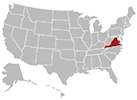
In Virginia, the demand for veterinary techs is strong.
If you are interested in joining an industry that is on the rise, then this article is for you!
Page Navigation
- Veterinary Technician Job Description and Duties in Virginia
- Education and Training Required for Veterinary Technicians in Virginia
- Becoming a Licensed Veterinary Technician in Virginia
- Employment and Salaries for Veterinary Technicians in Virginia
- Additional Information for Veterinary Technicians in Virginia
Veterinary Technician Job Description and Duties in Virginia
You’ll have a full day working as a vet tech as you assist a licensed veterinarian.
The tasks and duties are not the same ones every single day, but they could be the following ones:
- Administering medications
- Taking x-rays,
- Processing tissue samples,
- Assisting in surgery and emergency care
- Performing lab tests
- Teeth cleaning,
- Electrocardiography,
- Bandaging,
- Wound cleaning,
- Keeping accurate records
The next procedures belong to the licensed vet and not you:
- Performing surgeries
- Prescribing medicine or treatments
Education and Training Required for Veterinary Technicians in Virginia
The Virginia Board of Veterinary Medicine requires you to hold a license to get employed.
This is common across many states.
Obtaining at least an Associate’s Degree in Applied Science with Veterinary Technology is the basic requirement for licensure.
You can obtain this degree in about 2 years.
If you have enough patience, in about 4 years you can obtain a Bachelor’s degree that offers more career options later on.
Regardless, the American Veterinary Medical Association must accredit the educational route you opt for.
Virginia’s colleges that have accredited programs, can be seen below.
Top 4 Schools in Virginia
| School Name | Address |
|---|---|
| Blue Ridge Community College | 1 College Lane, Weyers Cave, Virginia 24486-0080 |
| Northern Virginia Community College | 4001 Wakefield Chapel Rd, Annandale, Virginia 22003-3796 |
| Patrick Henry Community College | 645 Patriot Avenue, Martinsville, Virginia 24112 |
| Tidewater Community College | 121 College Place, Norfolk, Virginia 23510 |
What you should know about these programs is that they all have a mandatory practice period.
The practice must take place at an approved veterinary clinic or practice.
Spots are also limited and applications are the only way in.
Applications usually involve:
- A high school diploma or GED
- An essay
- To pass an interview
- Health insurance
- A malpractice policy
- Antirabies vaccine
- To pass a TB test
- To have a clean criminal record
All future vet techs will study:
- Introduction to veterinary technology
- Anatomy and physiology
- Emergency care and first aid
- Pathology
- Anesthesiology
- Radiology
- Immunology
- Pharmacology
- Parasitology
- Toxicology
- Nutrition
If you can’t get into a program in Virginia, you have the option to enroll in a distance learning course.
The condition is to find a solution for holding the exams as well as figuring out the practice period.
Becoming a Licensed Veterinary Technician in Virginia
In Virginia, you’ll get licensed by the Virginia Board of Veterinary Medicine and only if you graduated from an accredited school.
The licensing process requires:
- An application form
- Official school transcripts
- Payment of some fees
- To pass the Veterinary Technician National Examination (VTNE)
- To pass a criminal background check
- A letter of recommendation from a licensed and practicing veterinarian
You must answer at least 70% of the 150 questions the VTNE has if you want to pass.
Your time limit is 3 hours.
Every year, veterinary techs in Virginia renew their licenses by completing 6 hours of continuing education.
Employment and Salaries for Veterinary Technicians in Virginia
Knowing more about where you can find a job, can be beneficial for your future career.
These are major facilities in which vet techs work:
- Private clinical practices
- Animal sanctuaries
- Veterinary teaching hospitals
- Rescue centers
- Wildlife or exotic animal rehabilitation centers
- Humane societies,
- Research facilities,
- Pharmaceutical companies
Some of the best employers in Virginia are:
- Animal & Plant Health Inspection (USDA)
- GodSpeed Animal Care (Williamsburg)
- Virginia Department of Animal Health & Emergency Services (Richmond)
- Heart of Virginia Veterinary House Calls (Central-Virginia)
- Arlington Equine Diagnostics (Arlington)
- Virginia Veterinary Specialists (Charlottesville & Lynchburg)
The table below shows how the city you live in can influence how much you earn.
Annual Salary Range:Average Salary of Veterinary Technicians in Virginia
| City Name | Salary |
|---|---|
| Virginia Beach | $35,431 |
| Norfolk | $34,897 |
| Chesapeake | $34,853 |
| Richmond | $36,980 |
| Newport News | $34,720 |
| Hampton | $34,720 |
| Alexandria | $41,257 |
| Portsmouth | $34,897 |
| Roanoke | $34,264 |
| Lynchburg | $34,137 |
Additional Information for Veterinary Technicians in Virginia
If you need to find a job or other field-related to your field, use these resources:
- Virginia Association of Licensed Veterinary Technicians
- Virginia Veterinary Medical Association
- Virginia Board of Veterinary Medicine
- Academy of Veterinary Technician Anesthetists
- Academy of Veterinary Emergency & Critical Care Technicians
- Academy of Internal Medicine for Veterinary Technicians
- NAVTA
- Veterinary Career Network
- Vet Tech Life
- Vetcetera,
- Where Techs Connect




